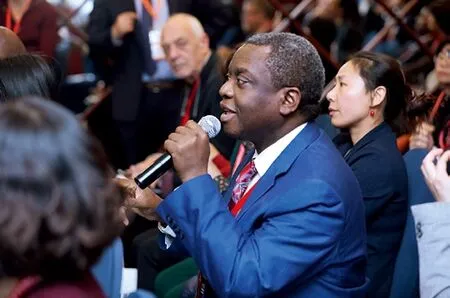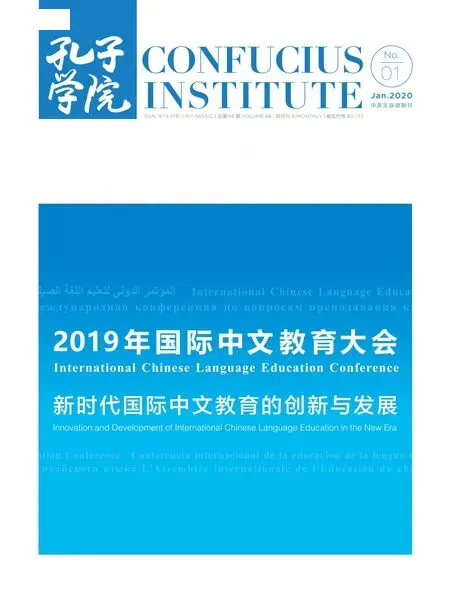孔子学院创新发展


论坛围绕“孔子学院公共形象塑造”“中外大学发挥孔子学院办学主体作用”“孔子学院的特色化发展与区域协作”和“孔子学院办学质量评估”四个主题举办工作坊,来自17 个国家的25 名代表在论坛上发言,现场650 人(次)观众围绕各工作坊主题展开热烈讨论,充分交流经验,为孔子学院创新发展提出诸多建设性意见。
工作坊1:孔子学院形象塑造
南非约翰内斯堡大学副校长Saurabh Sinha 指出孔子学院的形象塑造与其所在大学的形象塑造紧密联系和密切相关,应积极利用现代科技、新媒体平台和科研成果来打造品牌,中外方校级领导应直接参与,用定量研究方法分析提升孔子学院形象的成效。尼日利亚纳姆迪·阿齐克韦大学孔子学院理事Emmanuel Chukwunonye Ojukwu 提到,孔子学院的学员就是文化大使,每一个成功的学员会影响一批人,孔子学院的形象是通过每个学员来塑造的。英国兰开夏中央大学孔子学院外方院长余斐霞表示,公关在形象建设中起着积极的作用,不仅要对外公关,也要对内公关,要让人一想到中国文化就想到孔子学院;形象建设不仅要有财力上的投资,更要有时间上的投资,使得形象建设具有可持续性。美国西弗吉尼亚大学副校长William Iriving Brustein 表示,应鼓励孔子学院向所在大学和相关部门展示其学术以及其他附加价值,得到当地机构的支持和帮助。意大利那不勒斯东方大学校长 Elda Morlicchio 介绍,那不勒斯东方大学孔子学院努力在那不勒斯社区培育中国文化,使其成为当地文化的一个组成部分;其工作内容不仅包括介绍中国传统文化,如通过中文教学,帮助当地中小学学生更好地认知中国文化,还包括促进意大利和中国的友好交往,如组织经济、一带一路、5G 科技发展国际会议等。
工作坊2:中外大学发挥孔子学院办学主体作用
四位外国大学代表和四位中国大学代表分别从中外方角度进行了分享。日本北陆大学专务理事周航认为,外方大学校在领导层支持、学院法律地位、人员和经费方面应给予支持,不能全部依靠孔子学院总部。巴西南大河联邦大学孔子学院院长 Antonio Domingos 表示应通过孔子学院积极促进两国在人员、贸易方面的交流。乌干达麦克雷大学副校长Barnabas Nawangwe 指出其大学的孔子学院虽成立时间较短,但大学十分珍视孔子学院为其带来的价值。承办多所孔子学院的中方大学代表,如中国政法大学校长马怀德、北京语言大学副校长张宝钧、大连外国语大学副书记王伟辰和中国吉林大学国际交流处处长张广翠均介绍了中方大学为支持所承办的孔子学院所提供人员、经费、教材、文化用品、行政等各方面的支持,指出支持孔子学院是一项系统工程,为大学对外交流提供了宝贵的机会和经验。中外代表一致认为,孔子学院总部在孔子学院办学过程中,应该提供更多的政策指导和支持。来自赞比亚、南非、尼日利亚等多国校领导在观众席中发言,他们表示为各自大学的孔子学院感到骄傲。美国的一位院长指出,面对当前对孔子学院的无端指责,应探索创新的思路去开展工作,今年的“国际中文教育大会”本身就是一个非常好的例子。
工作坊3:孔子学院的特色化发展与区域协作
代表们认为应找准对方需求,开展高质量的文化项目。例如,美国加州大学洛杉矶分校孔子学院、俄罗斯圣彼得堡国立大学孔子学院通过电影这个媒介开展国际电影展,协同合作,与当地艺术馆进行长期合作、与电影院线合作引进中国电影,邀请中国知名导演与当地导演与艺术家进行学术交流,给予当地民众艺术启发和灵感。有代表认为,应结合中外双方大学专业能力和当地需求,开展相关“中文+”的项目。例如,葡萄牙科英布拉大学孔子学院在大学里开展传统中医药培训,包括开设中医药的基础课程,中医养生和健康等项目,与当地协会合作组织相关培训,除了在孔子学院所在城市,还在其他城市进行中医药的巡讲和培训。一些孔子学院成立了“一带一路”科研中心等。例如,英国兰卡斯特大学孔子学院定期邀请国内外专家召开研讨会,依托孔子学院平台,建立中外专家团队联合开展研究课题和项目,这些经费来自于孔子学院总部和外方大学的支持,已取得一定影响力的学术成果,发表多篇SCI 论文。在协同合作方面,代表一致表示,要充分利用各方面资源,挖掘合作大学动力,凝聚社会力量,共享孔子学院平台,除了在中文专业方面的合作,还包括其他人文交流各领域的合作。

工作坊4:孔子学院办学质量评估
孟加拉国南北大学校长Atiqul Islam、南非约翰内斯堡大学副校长Saurabh Sinha 指出,质量评估也许会给被评估单位造成一定压力,但却是保证孔子学院良好可持续发展的必要手段,如何做好质量评估,是孔子学院中外方承办单位和孔子学院总部应该高度重视的问题。法国布列塔尼孔子学院外方院长Blaise Thierrée、西班牙萨拉戈萨大学孔子学院中方院长崔予文认为,质量评估应当注重多样化,注重评估维度的多样化,即是否契合大学的战略发展规划,是否满足当地政府和社区对中文和中华文化的理解需要,是否符合孔子学院学员和家长对中文学习的成果期待等;多样化还包括评估方法的多样化,即注重定性分析和定量分析的结合,兼顾评估信度和效度,综合考虑评估的统一标准和国别、地区本土化差异,体现评估结果的横向和纵向可比性,实现科学评估。英国诺丁汉大学孔子学院外方院长Jason Feehily 认为,评估可以是年度工作,也可以是季度、月度工作,评估不是目的,以评估结果来推动孔子学院提质增效,实现可持续良性发展才是目的。美国北卡罗来纳大学夏洛特分校孔子学院外方院长张永龄认为,评估单位要注重且兼顾两个方面的内容,一是要用数据说话。没有实证数据和定量分析做基础,任何溢美之词都无立足之地;二是也要关注不可量化的定性内容,例如对大学国际化战略和学科建设进程的贡献,增进社区人民对中国的好感和理解程度等,大多是不可量化的,但也必须纳入评估考虑之中。德国慕尼黑孔子学院外方院长高芳芳建议可以考虑采用ISO9001 等国际化的质量管理体系评估方法,在国外比较有说服力。这种认证办法不是一次认证终身合格的,而是每年都有定期回访。通过这种不断的监督与打磨,可以敦促孔子学院实现长期透明公开、合法合规、高效的可持续运作,并且可以避免因人员更迭而导致的管理脱节。
The forum held four workshops centering on “image building of the Confucius Institute”, “Chinese and foreign universities play Confucius Institute’s main role in school-running”, “featured development and regional cooperation of the Confucius Institute”and “performance evaluation of the Confucius Institute”. 25 delegates from 17 countries made statements on the forum, and 650 audiences performed heated discussion on these four themes,shared their experience, and proposed constructive suggestions for the innovative development of the Confucius Institute.
Workshop 1: Image Building of Confucius Institute
Saurabh Sinha, Deputy Vice Chancellor of the University of Johannesburg in South Africa, pointed out that the image building of the Confucius Institute has a close relationship with the image building of the host university, and can be realized by modern technology, new media platform and achievements in scientific research. Leaders of Chinese and foreign universities should take the lead to participate in the image building as well as analyze and improve the image of the Confucius Institute by quantitative research. Emmanuel Chukwunonye Ojukwu, Council Member of the Confucius Institute at Nnamdi Azikewe University in Nigeria,said that students in the Confucius Institute symbolize culture ambassadors and set an example for others by their success. The image of the Confucius Institute is built by every Confucius Institute student. Yu Feixia, Foreign Director of the Confucius Institute at the University of Central Lancashire in the U.K., said that,public relations play a positive role in building the image of the Confucius Institute. We should build good internal and external public relations of the Confucius Institute, so that the Confucius Institute will cross their mind when people think of China; image building is not just about investment of finance but of time, which can realize the sustainability of the image building. William Iriving Brustein, Vice President of West Virginia University in the U.S., said that the Confucius Institute should be encouraged to present its academic and other added values to its host university and relevant departments, so as to obtain support and assistance from local institutions. Elda Morlicchio, Director of Oriental University of Napoli in Italy, introduced that the Confucius Institute at Oriental University of Napoli is working on cultivate Chinese culture in local communities to integrate it into a part of local culture. The Institute is working on not only introducing Chinese traditional culture, such as helping elementary and middle school students better know about Chinese culture by teaching Chinese language, but also on developing the friendly relations between China and Italy, such as organizing international meetings related to economy, the Belt and Road and 5G technology development.
Workshop 2: Chinese and Foreign Universities Play Confucius Institute’s Main Role in School-Running

Four delegates from foreign universities and four delegates from Chinese universities shared their views. Zhou Hang,Specialized Council Member of Hokuriku University in Japan,said that the foreign universities should support the Confucius Institute in legal status identification, staff and fund, not just relying on the Confucius Institute Headquarters. Antonio Domingos, Director of the Confucius Institute at Federal University of Rio Grande do Sul in Brazil, said it is hoped to promote personnel and trade exchanges between China and Brazil through the Confucius Institute. Barnabas Nawangwe, Vice-Chancellor of Makerere University of Uganda, pointed out his university cherishes the values brought by its newly founded Confucius Institute. The delegates of Chinese universities that have founded several Confucius Institutes with host universities, including Ma Huaide, President of China University of Political Science and Law, Zhang Baojun, Vice President of Beijing Language and Culture University, Wang Weichen, Vice Chair of the University Council of Dalian University of Foreign Languages, and Zhang Guangcui, Director of the Office of Global Engagement of Jilin University, introduced the support offered by Chinese universities in staff, fund, textbooks, cultural articles, and administration for establishing the Confucius Institutes. They also pointed out that the Confucius Institute as a systematic project provides valuable opportunities and experience for universities’ external exchanges. In addition, all delegates agreed that the Confucius Institute Headquarters should offer more policy guidance and support. Principals from the universities in Zambia, South Africa and Nigeria made statements in audience seats. They said they are proud of the Confucius Institutes at their universities. A U.S.Confucius Institute director said that for those groundless accusations against the Confucius Institute, we should explore innovative ways to continue our work. This year’s International Chinese Language Education Conference is a great example in its own right.

Workshop 3: Featured Development and Regional Cooperation of Confucius Institute
The delegates reckoned that we should launch high-quality cultural programs based on people’s needs. For example, the Confucius Institute at the University of California, Los Angeles and the Confucius Institute at Saint Petersburg State University in Russia, held international film exhibitions, established a longterm partnership with local arts museums, and had cooperation with movie theaters to introduce Chinese films. They also invited Chinese renowned directors to have academic exchanges with local directors and artrists, inspiring local people in art. Some delegates said that we should carry out relevant “Chinese+” programs based on specialty advantages of both universities and local needs. For example, the Confucius Institute at the University of Coimbra in Portugal has set up training programs of traditional Chinese medicine (TCM), and offered TCM basic courses and TCM health preservation projects and other health projects. It has also organized training in cooperation with local associations,and launched tour lecture and training on TCM in other cities.Some Confucius Institutes have set up the Belt and Road research centers. For example, the Confucius Institute at Lancaster University in the U.K. has invited experts at home and abroad to hold seminars on a regular basis, and built expert teams through the Confucius Institute to carry out research on subjects and projects under the financial support from the Confucius Institute Headquarters and the host university. At present, it has already achieved the academic achievements with a certain influence and published multiple SCI theses. The delegates agreed that we should make best use of various resources, explore the potential of host universities, obtain social support, and share the platform of the Confucius Institute, to realize cooperation in Chinese language as well as people-to-people and cultural exchanges.

Workshop 4: Performance Evaluation of Confucius Institute
Atiqul Islam, President of the North-South University of BAtiqul Islam, Vice Chancellor of North South University in Bangladesh, and Saurabh Sinha, Deputy Vice Chancellor of the University of Johannesburg in South Africa, pointed out performance evaluation will put some pressure on the institution to be evaluated, but is a necessary approach to keep the sustainable development of the Confucius Institute. How to carry out performance evaluation is a problem that Chinese and host universities and the Confucius Institute Headquarters need to pay great attention. Blaise Thierrée, Foreign Director of the Confucius Institute in Bretagne in France, and Cui Yuwen, Chinese Director of the Confucius Institute at the University of Zaragoza in Spain, said that performance evaluation should be diversified in dimension.In other words, whether it is fit for the university’s strategic development plan, whether it can help the local government and communities understand Chinese language and culture, whether it can meet the expectations of students and parents for the results of Chinese learning. Moreover, performance evaluation should be diversified in method, i.e. it should focus on the combination of quantitative analysis and qualitative analysis, and consider evaluation reliability and validity, as well as unified evaluation standards and differences between countries and regions, and embody the horizontal and vertical comparability of evaluation results, so as to realize scientific evaluation. Jason Feehily, Foreign Director of the Confucius Institute at the University of Nottingham in the U.K., said that this performance evaluation can be conducted by month, quarter or year. Its aim is to improve the teaching quality and outcomes of the Confucius Institute by evaluation results,thus realizing sustainable development. Zhang Yongling, Foreign Director of the Confucius Institute at the University of North Carolina at Charlotte in the U.S., said that the evaluation institution should focus on and consider two aspects: first, evaluation should base on data. Without real data and quantitative analysis,any praises are groundless; the second is qualitative content that is unquantifiable. For example, the contribution to the university’s internationalization strategy, the discipline construction, and the promotion of the community’s goodwill and understanding of China are unquantifiable, but should be taken into account. Gao Fangfang, Foreign Director of the Confucius Institute in Munich,suggested adopting some international evaluation approaches such as quality management system ISO9001, which is more persuasive abroad and conducted by year. According to such supervision and polishing, the Confucius Institute can realize a long-term, open, transparent, efficient, legitimate and sustainable operation, while avoiding the disorder in management due to staff changes.

